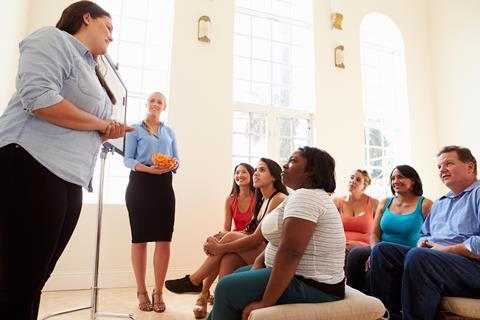‘I find myself putting on a Sunday service mask of being cheerfully uncomplicated. Perhaps it’s because of a misapprehension that, as a person of faith, I should have all the answers or be able to cope,’ says Emily Bright.

I’m a recovering chocoholic, a self-confessed Cookie Monster. Recently, I’ve spotted striking parallels between my Slimming World group and church. For starters, there’s the regular accountability. Slimming World – evangelical about being a sustainable eating plan, not a crash diet – runs weekly weigh-ins, which track a person’s progress. These are followed by group support sessions known as image therapy.
After weigh-in, our group leader – known as a consultant – gently asks each of us how our week’s been foodwise, what difficulties we’ve encountered, and our aims for the coming week.
Occasionally it’s a cathartic confessional, where I admit to inhaling a family-size bar of Dairy Milk ahead of a stressful deadline at work
Occasionally it’s a cathartic confessional, where I admit to inhaling a family-size bar of Dairy Milk ahead of a stressful deadline at work (cue empathetic nods from fellow food-lovers). Thankfully, the consultant responds with a large dollop of understanding. That kind of grace after confession can be found in a church context too.
READ MORE: How God changed my thinking and led me to start a women’s movement
Image therapy is mainly about celebrating our group wins – both on and off the scales – commiserating with each other on a tough week or simply resetting our attitudes. We swap ideas and inspiration.
When group members make themselves vulnerable in sharing their challenges, it encourages me to be more open as well. There’s no shame or judgement, only support and understanding. Leaving image therapy, I always feel greatly encouraged.
For Christians, Sundays offer us similar accountability and support through encounters with the Holy Spirit and conversations with church family. I’ve got treasured friendships, the go-to girls who are always there to listen to my emotional offloads if required, just as I’ll be there for them.
Yet recently, I’ve typically done a runner after the service, grabbing a church coffee to go. Why am I more vulnerable with Slimming World pals than at church?
Maybe because at Slimming World, there’s a natural camaraderie through weigh-ins and instant post-results analysis.
Maybe because at Slimming World, there’s a natural camaraderie through weigh-ins and instant post-results analysis. “How did you get on?” group members innocently enquire after I step off the scales. Their supportive interest prompts an honest reaction.
READ MORE: When gossip is disguised as prayer
Some weeks, I’m like Tigger on a space hopper, bounding over to them with delight at a great weight loss. Other weeks, I’m quietly downcast, and still others, I’m venting about the frustrations which drove me to the biscuit tin. Smiles and knowing nods tell me that it’s OK to feel this way. And after a bad week, I’ve learnt, that’s when it’s most essential to stay for the group support. The same could be said for church.
Yet I find myself putting on a Sunday service mask of being cheerfully uncomplicated. Perhaps it’s because of a misapprehension that, as a person of faith, I should have all the answers or be able to cope. I forget that if I open up like at my Slimming World group, I’ll be met with love, not judgement. So when someone asks me about how my week was, my default response has become “fine”, or “I’m plodding on” to shut down further enquiries or emotions.
READ MORE: The Bible values the wisdom of older generations so let’s raise confident women together
I kid myself that, by passively showing up at church, I’ll be recharged for a new week. As I’m fiercely self-reliant, it feels easier to keep up the pretence that all is well rather than admit that I’m sometimes feeling frustrated, tired or sad.
But one Sunday recently, I felt a wave of emotion after the church service. It prompted me to offload to a friend later that week about what I was grappling with. She sent a voice note back filled with compassion, encouragement and wisdom, which empowered me to deal with the situation effectively.
It reminded me that as a Christian, it’s OK to struggle, but not to stay there alone. I’ve realised that asking for support is the most courageous and healthy thing to do. Opening up to trusted friends can bring about a freedom that’s off the scale.



































No comments yet